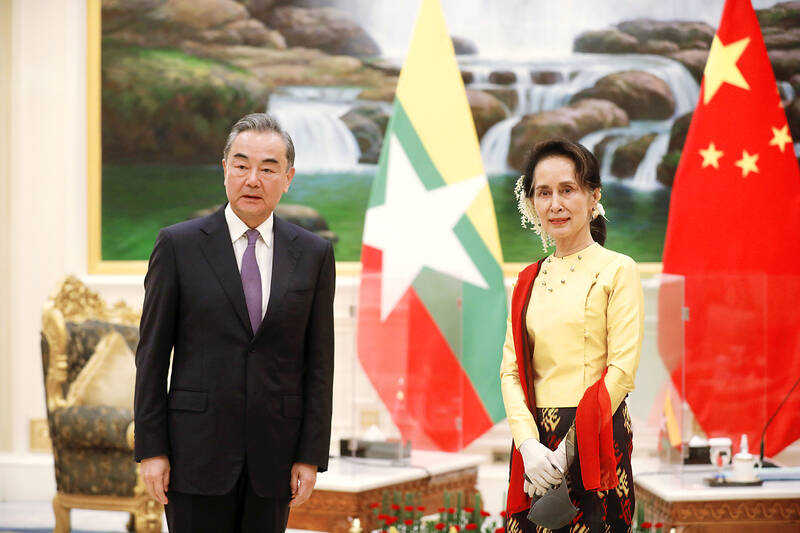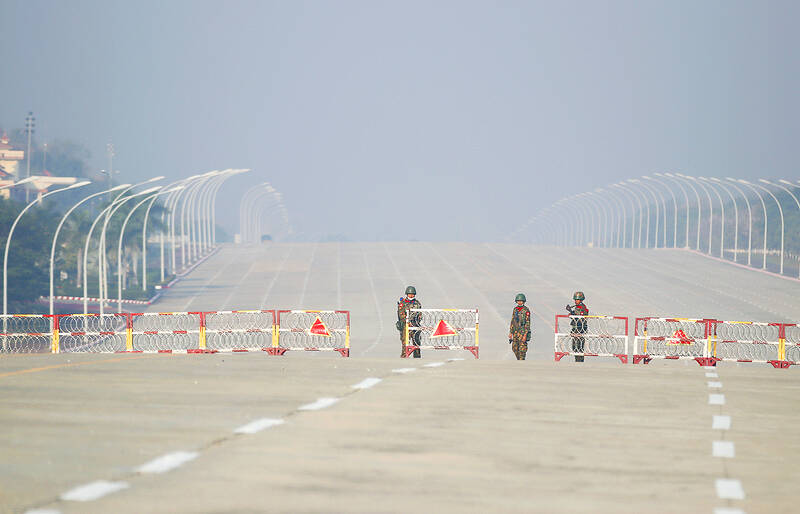A Myanmar junta court yesterday sentenced ousted leader Aung San Suu Kyi to another six years in prison for corruption, a source with knowledge of the case said, taking the Nobel Peace Prize laureate’s total jail time to 26 years.
Aung San Suu Kyi, 77, has been detained since the Burmese military toppled her administration in a coup on Feb. 1 last year, ending the country’s brief period of democracy.
She has since been convicted on a clutch of charges, including breaching an official secrets act, electoral fraud and illegally possessing walkie-talkies.

Photo: EPA-EFE
In the latest case, the Nobel laureate was “sentenced to three years imprisonment each for two corruption cases,” in which she had been accused of taking bribes from a businessman, the source said.
The businessman, Maung Weik, last year appeared in a video televised by a military broadcaster claiming he had given Aung San Suu Kyi US$550,000 over several years.
Maung Weik — who was convicted of drug trafficking in 2008 — also said he had donated money to senior figures in the ousted leader’s National League for Democracy for the good of his business.

Photo: EPA-EFE
APPEAL EXPECTED
Aung San Suu Kyi — who denies all charges against her — appeared in good health and would appeal the decision, the source added.
She is on trial for five other corruption charges. Each carries a maximum 15 years in prison.
An Amnesty International spokesperson yesterday slammed the trial as a sham that “cannot be taken seriously.”
“Myanmar’s military is heaping trumped-up charge after trumped-up charge on Aung San Suu Kyi as part of a broader campaign to lock up and silence any and all opponents,” they said.
A junta spokesman did not respond to a request for comment.
Journalists have been barred from attending the court hearings, and Aung San Suu Kyi’s lawyers have been banned from speaking to the media.
In June, she was transferred from house arrest to a prison in the capital, Naypyidaw, where her trials are held in a courthouse inside the prison compound.
Aung San Suu Kyi has been the face of Myanmar’s democratic hopes for more than 30 years and was previously a political prisoner.
Since February last year, she has once again been confined by the military, with her only link to the outside world now brief pre-trial meetings with lawyers.
Many of her political allies have also been arrested since the coup, with one chief minister sentenced to 75 years in jail.
The Southeast Asian nation has been in turmoil since the military seized power, sparking widespread armed resistance.
The junta has responded with a crackdown that rights groups say includes razing villages, mass extrajudicial killings and airstrikes on civilians.
More than 1 million people have been displaced since the coup, the UN estimates.
More than 2,300 people have been killed and more than 15,000 arrested since the military seized power, a local monitoring group said.

A new online voting system aimed at boosting turnout among the Philippines’ millions of overseas workers ahead of Monday’s mid-term elections has been marked by confusion and fears of disenfranchisement. Thousands of overseas Filipino workers have already cast their ballots in the race dominated by a bitter feud between President Ferdinand Marcos Jr and his impeached vice president, Sara Duterte. While official turnout figures are not yet publicly available, data from the Philippine Commission on Elections (COMELEC) showed that at least 134,000 of the 1.22 million registered overseas voters have signed up for the new online system, which opened on April 13. However,

ENTERTAINMENT: Rio officials have a history of organizing massive concerts on Copacabana Beach, with Madonna’s show drawing about 1.6 million fans last year Lady Gaga on Saturday night gave a free concert in front of 2 million fans who poured onto Copacabana Beach in Rio de Janeiro for the biggest show of her career. “Tonight, we’re making history... Thank you for making history with me,” Lady Gaga told a screaming crowd. The Mother Monster, as she is known, started the show at about 10:10pm local time with her 2011 song Bloody Mary. Cries of joy rose from the tightly packed fans who sang and danced shoulder-to-shoulder on the vast stretch of sand. Concert organizers said 2.1 million people attended the show. Lady Gaga

ALLIES: Calling Putin his ‘old friend,’ Xi said Beijing stood alongside Russia ‘in the face of the international counter-current of unilateralism and hegemonic bullying’ Chinese President Xi Jinping (習近平) yesterday was in Moscow for a state visit ahead of the Kremlin’s grand Victory Day celebrations, as Ukraine accused Russia’s army of launching air strikes just hours into a supposed truce. More than 20 foreign leaders were in Russia to attend a vast military parade today marking 80 years since the defeat of Nazi Germany in World War II, taking place three years into Russia’s offensive in Ukraine. Putin ordered troops into Ukraine in February 2022 and has marshaled the memory of Soviet victory against Nazi Germany to justify his campaign and rally society behind the offensive,

CONFLICTING REPORTS: Beijing said it was ‘not familiar with the matter’ when asked if Chinese jets were used in the conflict, after Pakistan’s foreign minister said they were The Pakistan Army yesterday said it shot down 25 Indian drones, a day after the worst violence between the nuclear-armed rivals in two decades. Pakistani Prime Minister Shehbaz Sharif vowed to retaliate after India launched deadly missile strikes on Wednesday morning, escalating days of gunfire along their border. At least 45 deaths were reported from both sides following Wednesday’s violence, including children. Pakistan’s military said in a statement yesterday that it had “so far shot down 25 Israeli-made Harop drones” at multiple location across the country. “Last night, India showed another act of aggression by sending drones to multiple locations,” Pakistan military spokesman Ahmed